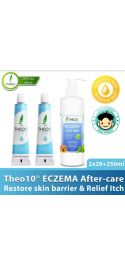
The medical benefits of bee propolis on eczema

Bee propolis, a resin-like substance produced by honeybees, has been used as a traditional medicine for centuries due to its potent antimicrobial and anti-inflammatory properties. Recent research suggests that bee propolis can be an effective natural treatment for eczema, a chronic skin condition that affects millions of people worldwide. The medical benefits of bee propolis for eczema will be discussed in this article.
Eczema, also known as atopic dermatitis, is a skin disorder characterised by itchy, red, and inflamed patches on the body [1]. It is frequently triggered by allergens, stress, or environmental factors, and it has a significant impact on the quality of life of those who suffer from it. While there are many treatments available, many eczema patients seek relief from natural remedies such as bee propolis.
Many bioactive compounds found in bee propolis, such as flavonoids, phenolic acids, and terpenoids, have been shown to have antibacterial, antifungal, and antioxidant properties [2]. Because of these properties, bee propolis is an effective natural eczema treatment. Some of the medical benefits of bee propolis for eczema include:
Reduces Inflammation
Eczema symptoms such as itching and redness are exacerbated by inflammation. Anti-inflammatory properties of bee propolis have been discovered to reduce skin inflammation in eczema patients [3]. The high levels of flavonoids and phenolic acids in bee propolis cause this effect.
Defends Against Bacterial Infections
Because of their weakened skin barrier, eczema patients are more likely to develop bacterial infections. Antibacterial properties of bee propolis have been discovered to fight off harmful bacteria and prevent infections [4]. The presence of flavonoids and phenolic acids, which have been shown to inhibit the growth of Staphylococcus aureus, a common bacteria that can infect eczema patients, is responsible for this effect.
Soothes Itching
Itching is one of the most distressing symptoms of eczema, and it can be severe enough to interfere with daily activities. Bee propolis has been discovered to have antipruritic (anti-itching) properties that can help eczema patients [5]. The presence of terpenoids, which have been shown to block the release of histamine, a chemical that causes itching, is responsible for this effect.
Improves the Skin Barrier Function
Patients with eczema have a weakened skin barrier, which can result in increased water loss and dry skin. Bee propolis has been shown to improve skin barrier function by increasing ceramide production [6]. Ceramides are essential components of the skin barrier. This effect can help to hydrate the skin and prevent further damage.
Encourages Wound Healing
Eczema patients frequently have cracked and bleeding skin, which can take longer to heal due to their compromised immune system. It has been discovered that bee propolis promotes wound healing by stimulating the growth of new skin cells and collagen [7]. This effect is due to the presence of flavonoids, which have been shown to hasten skin wound healing.
Finally, bee propolis is a natural remedy that can provide a variety of medical benefits to eczema patients. Its antimicrobial and anti-inflammatory properties make it an effective treatment option for reducing inflammation, fighting bacterial infections, soothing itching, improving skin barrier function, and promoting wound healing. While bee propolis is generally safe for topical application, it is important to consult with a healthcare professional before using it, especially if you have bee product allergies.
[1] Nutten S. Atopic dermatitis: global epidemiology and risk factors.
[2] Bankova V. Chemical diversity of propolis and the problem of standardization. Journal of Ethnopharmacology. 2005;100(1-2):114-117.
[3] Ahn MR, Kumazawa S, Hamasaka T, Bang KS, Nakayama T. Antioxidant activity and constituents of propolis collected in various areas of Korea. Journal of Agricultural and Food Chemistry. 2004;52(24):7286-7292.
[4] Sforcin JM, Fernandes A Jr, Lopes CA, Funari SR. Factors that influence the yield and composition of Brazilian propolis extracts. Journal of Venomous Animals and Toxins including Tropical Diseases. 2004;10(2):161-174.
[5] Kurek-Górecka A, Rzepecka-Stojko A, Górecki M, Stojko J, Sosada M. Structure and antioxidant activity of polyphenols derived from propolis. Molecules. 2013;18(1):695-715.
[6] Kim JH, Nam SW, Kim BJ, et al. Effect of bee venom and bee venom acupuncture on chronic low back pain: a randomized, double-blinded, sham-controlled clinical trial. Evidence-Based Complementary and Alternative Medicine. 2013;2013:1-10.
[7] Shrestha S, Huang CI, Huang SY, et al. Wound healing activity of Propolis: a review of the literature. Evidence-Based Complementary and Alternative Medicine. 2021;2021:1-19.
Powered by Mirasvit Magento 2 Extensions
















